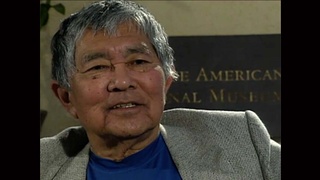Interviews
The situation after the war (Japanese)
(Japanese) During the war, my father’s income was cut off, and his house was burned in an air strike. All the different possessions and property he had brought back from America – all of it became nothing. The farmland and rice fields he owned, as well, were all confiscated – or rather, absorbed, I suppose – by the Japanese government, because he was deemed an absentee landlord. That land was all given to tenant farmers, almost completely without compensation.
In that international agreement, it says that once war has ended, the property of civilians will be returned. This is a standard of international treaties. So, one reason my father was looking forward to the end of the war was that once his stocks and bonds – frozen in America – were returned to him, he could live a somewhat comfortable life, like he had before the war.
However, after the war, America didn’t ask anything of the Japanese government, right? It didn’t demand any territory or reparations. America took a very generous attitude in dealing with Japan. So, in response to this, Yoshida Shigeru, representing Japan at the peace conference in San Francisco, stated that all Japanese assets in America were to be given up to America. My father’s private assets were included in that. So, at the age of 60, my father lost all his property.
So, then the question became, what would happen if I, who had American citizenship, went back to America. My aunt over here asked Nissei lawyers and different people, and they said there might be a chance of getting the property back. My plan was to get back my father’s property, come back, and start going to college in Japan again. So, with that in mind, I went back to America. But, it was no good. There was no money, in the end, and I got stuck here – I couldn’t go back. That’s how my life in America began.
Date: January 31, 2012
Location: California, US
Interviewer: John Esaki, Yoko Nishimura
Contributed by: Watase Media Arts Center, Japanese American National Museum





